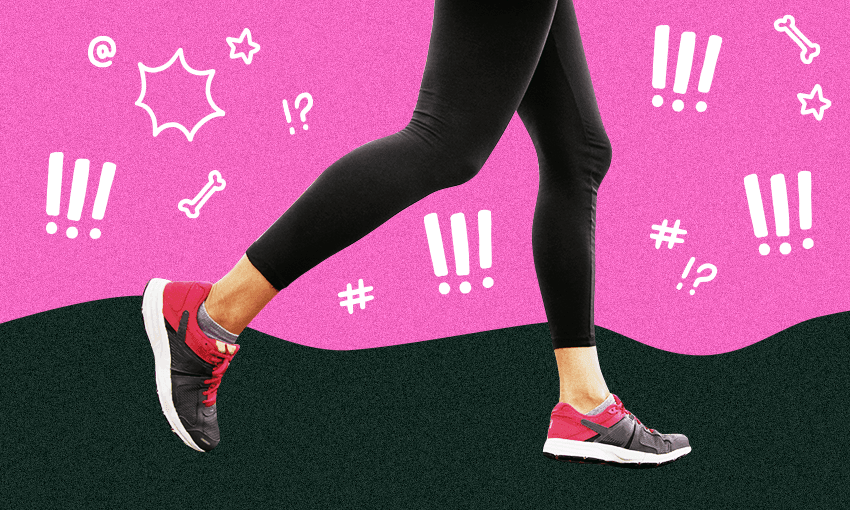As women we already tailor our running routines and apparel around the inherent risk of being outside and female. Now we need other genders to stand up and take our danger seriously.
In my eyes, nothing beats the feeling of stepping outside into the crisp evening air to wind down the day with a run. There’s something transcendent about the rhythmic sound of feet striking pavement, breath rising and falling in time with the beat of your heart. It’s meditative, forcing you to draw inward in a world that’s always calling our attention outward.
I’ve always described running as a filing system for my brain; by the end of a run wayward thoughts find a home, and as the dusk settles so does my mind. But there’s also an adrenaline rush that comes with the settling dusk; a deep-rooted fear reminding me that this sense of calm has a strict time limit. As the light wanes, so does my safety.
My fears are not baseless; a recent study out of the UK reported that 84% of women have experienced some form of harassment while out running. This is an unsurprising statistic. Though I’ve been fortunate to avoid serious harm, I’ve had beer cans thrown at me from car windows, I’ve been followed and filmed, yelled at and catcalled. Running through the suburbs of Hamilton one day, a sign-written company car slowed beside me and the driver rolled down the window. He leaned out, jeering and laughing as he made degrading comments about my body. I called the company later to report my experience but, as it turned out, the comments had come from the business owner himself. He chuckled down the phone and said “you need to lighten up lady”, before abruptly hanging up the phone.
Stories like that (echoed so often by the women I know) are often dismissed as trivial; and that just adds to my anger and heartbreak when I hear a story like that of Eliza Fletcher, the Memphis teacher who was murdered while out running earlier this month. “Liza” and I ran in many of the same circles, literally. Our paths crossed at virtual run clubs and on social media feeds. The news of her fate brought on that familiar sinking feeling in my stomach. That could’ve been one of my friends, my training partners, or my teammates. That could’ve been me.
Her murder was an isolated attack by a stranger reflecting the recent stories in the news of Mollie Tibbetts, Wendy Martinez, Karina Vetrano, Vanessa Marcotte, Sydney Sutherland, and Ashling Murphy. All of them female-identifying runners, killed doing what they love on different terrains across the globe, in different cities, and at different times of day. These stories are tragic but not unusual.
Such headlines have come to be accepted as normal, along with the inevitable social-media comments: “This is why women shouldn’t run at night”, “Why was she only wearing a sports bra?” and “Wrong place, wrong time!” This myopic narrative places women at the centre, suggesting these tragic situations are mere happenstance or the result of poor choices, rather than the result of systemic and deeply-rooted misogyny. Perpetration has been so normalised that once again, the onus of prevention is placed on the victims.
Men are certainly not immune to threats to their personal safety while exercising in public, but crime statistics worldwide make it clear that this problem has a highly gendered dimension. As women, we already accept the responsibility of mitigating our personal risk in ways many men don’t have to. Running with no headphones, running only in daylight hours along busy streets, informing loved ones of our location, choosing outfits that won’t attract attention, glancing behind ourselves periodically, and changing our routes accordingly. It’s touted as common sense, but those precautions don’t guarantee a safe return from a run. From an early age, we’re taught that existing in a public space as a woman is dangerous.
When I’ve spoken to the men in my life about my own experiences with catcalling and threats, the response has sometimes been disappointing, ranging from disbelief to belittlement and bemusement. Some have asked for more details, as though the addition of contextual information might legitimise what was said or done. While I’m out running, if I respond directly to those who catcall with anything less friendly than a people-pleasing smile, I’m told to “take a joke”. Sometimes, the tone changes quickly from lively to sinister.
Here’s the thing, a catcall isn’t just a catcall. It’s a microaggression that objectifies and dehumanises women. When we allow and overlook these more minor behaviours, we establish precedent for more significant and dangerous ones. Threatening and predatory behaviour in all its forms, is unacceptable. A fundamental culture change is required to ensure women feel safe to move in public spaces without fear. The large majority of men will never commit acts of violence against women. But attempts to make public spaces safe for women must actively include men as allies and agents for change.
Unfortunately, there are many difficult questions and few easy answers. There is much that we don’t yet know about how best we can intervene to make this world safer for women who want to exercise along the trails and on the roads. What we do know, however, is that we need to call on our men to be better. We need to ask them to stand alongside us as we challenge the ways in which women are spoken about and spoken to. We need them to hear us when we say there’s nothing minor about microaggressions, and believe us when we tell them what happens.
For now, I will continue to run without slipping on my headphones and enjoying a motivating playlist. I will continue to take new routes each day, and keep an eye on the people around me. I’ll continue to choose outfits that cover me up, and I will avoid secluded trails, dusk, and daybreak. But the responsibility for my safety should not sit wholly with me. Men, I’m not calling you out, I’m calling you in. Your sisters, mothers, daughters, and friends need you to listen and speak up. Women shouldn’t be killed at the hands of others while doing what they love.



